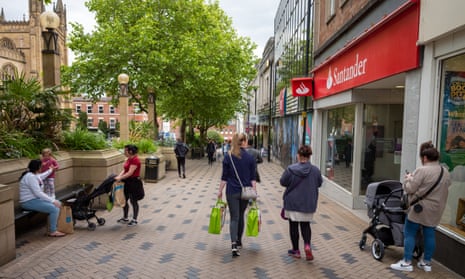From a seemingly unassailable position in 2019, Boris Johnson’s Conservatives have lost both their consistent poll lead over Labour and two byelections on the trot.
Partygate and the cost of living crisis mean that, if there were an election tomorrow, Johnson’s 2019 majority would in all likelihood be wiped out and Keir Starmer would end up in Downing Street. Much analysis has therefore turned to which voters are moving away from the Conservatives and how this plays out across different constituencies.
The recent shifts in voting intention come after a decade-long political realignment. Older voters, particularly pensioners, have moved towards the Conservatives while younger graduates, particularly those in big cities, have moved towards Labour.
However, this trend has left an increasingly important group of voters under-discussed and under-analysed. What about those working-age voters who live outside big cities and don’t have degrees? Given that political analysis is now only considered legitimate if it has a fun-sounding name attached, we have called these “Wand” (working-age-no-degree) voters.
In the 2019 Conservative landslide, Wands voted roughly in line with the country – with 31% backing Labour and 43% voting for the Conservatives. However, our most recent polling with Progressive Britain shows Labour now holds a five-point lead among this group – on 38%, compared to the Tories’ 33%.
Among Wand voters who supported the Conservatives at the last election, just 54% say they would still back the party in an election tomorrow. One in nine (11%) would switch straight to Labour while 27% don’t know who they would support.
And while his personality no doubt helped in 2019, nearly two-thirds (64%) of Wands now have an unfavourable view of the prime minister compared to just 26% who have a favourable view.
These shifts matter because, despite being underreported on, this group makes up a large proportion of the population. Based on our definition, 37% of voters are Wands – much more, for example, than pensioners, who make up just 18% of the population.
And Wands are a lot more likely to live in the constituencies that Labour needs to win to gain a majority. This includes many “red wall” constituencies such as West Bromwich West, Stoke-on-Trent North, and Ashfield. But it also includes other marginal areas, such as Peterborough, Corby, Swindon, and Milton Keynes.
In fact, of the 93 most marginal constituencies Labour will be trying to win from the Conservatives, most voters in 83 of them are working-age people without degrees. More than six in 10 (62%) of those who live in Wakefield, where Labour recently achieved an impressive byelection gain, are Wand voters.
Given that they are so important, it’s worth asking: what do Wand voters want? And what can the parties do to win their support?
First, Wands are more socially conservative than voters as a whole, with 59% having voted to leave the European Union in 2016. This is probably why support for the Conservatives among this group increased at the last election.
However, as research by Oxford University’s Jane Green, and Reading University’s Roosmarijn de Geus has found, Wands are also the most economically insecure group of voters. They are the least likely to have cash sitting in their bank account to fund an emergency expense, and the most likely to be suffering because of the cost of living crisis.
Because of their lack of economic security, Wands are more “wage driven” than other voter groups. When deciding whether to support a policy, they are more likely to think about the impact it would have on them and their family, and less likely to care about the impact it would have on the country as a whole.
In recent months, that personal economic interest has become more important than their socially conservative views. While most voter groups think that the cost of living is the most important problem facing the country, Wand voters are even more likely to think so. In our most recent poll, 53% said it is one of the most important political issue right now.
Ultimately, the battle for this group is going to come down to hard economics. Whichever party can offer them a realistic vision of how to improve their personal financial situation in tough times is likely to win their support.
And, given the electoral importance of Wand voters, the party that can win their support will win the next election.
Chris Curtis, head of political polling, Opinium
Tom Collinge, head of policy and communications at Progressive Britain, also contributed to this article

